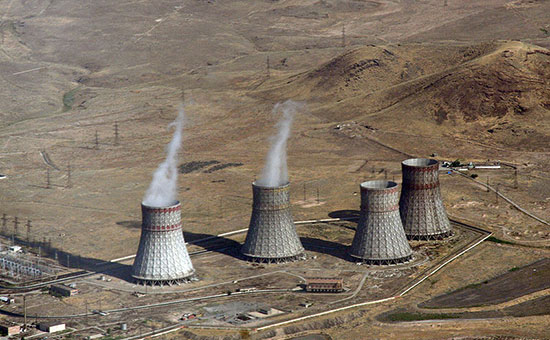
Renewed Calls To Close Metsamor Nuclear Power Station
Renewed Calls To Close Metsamor Nuclear Power Station
After the earthquake and tsunami in Japan and its disastrous impact on the Fukushima nuclear plant, the international community is once again raising concern about the Metsamor Nuclear Power station in Armenia. On April 11, National Geographic ran a powerful story, entitled “Is Armenia’s Nuclear Plant the World’s Most Dangerous?” (https://news.nationalgeographic.com/news/energy/2011/04/110412-most-dangerous-nuclear-plant-armenia/). The article cited the European Union’s envoy as calling the facility "a danger to the entire region" and the United States government, calling the plant "aging and dangerous." The forty year old plant is the only one of five first-generation water-moderated Soviet units that is located in the seismic zone. Despite the fact that it is long past its retirement age, the Armenian government refuses to shut it down. In 2004, it even refused the EU’s offer of a 200 million Euros ($289 million) loan to finance its closure. The magazine interviewed Antonia Wenisch of the Austrian Institute of Applied Ecology in Vienna, who calls Metsamor “among the most dangerous” nuclear plants still in operation.
Regional politicians are now questioning the safety and security of the facility. Adil Garibov, Director of the Institute of Radiation Problems of the National Academy of Sciences says that Azerbaijan might appeal to the International Atomic Energy Agency (IAEA) to conduct a detailed inspection of Metsamor (Trend news agency, April 6). “If an accident happens at this station, its consequences will mainly impact on Armenia. Therefore, international organizations must deal with this issue very seriously. This concern is not only a safety issue for Azerbaijan, but a concern for the whole world,” concluded Garibov.
Azerbaijan’s Minister of Ecology and Natural Resources, Huseyn Bagirov, also told journalists on April 15 that his organization is cooperating with the Ministry of Foreign Affairs and plans to appeal to the international community to close this plant. The last powerful earthquake in Armenia, with its epicenter only 60 miles from Metsamor, occurred in 1988, killing more than 25,000 people. Metsamor nuclear station does not have modern safety standards as most of the European nuclear power stations have and therefore after the earthquake its operations were suspended for seven years. Armenia also plans to build a new nuclear power station, worth $5 billion. On March 15, Novosti Armenii quoted an official in the Armenian Ministry of Emergency Situations, Zaven Khlgatyan, stating that the new plant would be finished by 2017.
Meanwhile, Azerbaijanis are continuing to campaign for the closure of Metsamor Station. Azeri Member of Parliament (MP) Rafael Huseynov has distributed a document in the Parliamentary Assembly of Council of Europe (PACE), entitled “The Source of Danger for Life, Europe Today and Future: Metsamor Nuclear Power Plant,” co-signed by 30 other PACE members from 20 European countries (www.day.az, April 11). The parliamentarians urge PACE to take this issue seriously and implement steps to solve it. Similar campaigns are taking place using the Internet, with Azerbaijani students and the diaspora urging European and US officials to pay closer attention to the problem. Democratic Congressman (D-Virginia) Jim Moran was one of the many officials responding to the campaign by the Azerbaijani Diaspora and expressed concern over the safety standards at Metsamor (www.day.az, March 29).
In Georgia, the weekly newspaper Palitra Nedelyi surveyed 417 respondents about the Metsamor station. 86 percent considered the facility to be potentially dangerous for their nation (Trend, March 28). Former Georgian President Eduard Shevardnadze urged the current Georgian government to open talks with Armenian officials regarding safety issues at the Metsamor nuclear plant. “News about the conditions of the Metsamor station raises serious concern. It turns out that the situation there is very critical while there are no safety guarantees there at all” Shevardnadze said in an interview to weekly newspaper Asaval-Dasavali on March 28 (www.day.az, March 28).
On March 17, the Turkish Minister of Environment and Forestry, Veysel Eroglu, said “the old Metsamor nuclear station poses a danger of radioactive pollution that might affect Turkey” (CNN-Turk, March 17). Despite these pleas by the international community, the Armenian government shows little sign of changing its position. The station provides 40 percent of the country’s electricity and the short term needs of the politicians seem to prevail over the long-term benefits of the environment and mankind.


